Homeschooling is tough, but so much fun. Homeschool Moms are always looking for helpful homeschool tips to help them. These are some that I have learned through my years and I hope you find them helpful as well.
Whether your new to homeschooling or a veteran homeschool mom, here are 12 homeschool tips to help you on your homeschool journey:
- Know Your State’s Homeschool Laws
- Learn What Works for You and Your Children
- Do Not Compare Yourself to Other Homeschool Moms
- Find a Homeschool Group or a Homeschool Support System
- Find an All-In-One Homeschool Curriculum for Your First Year
- Keep it Short
- Keep it Fun
- Be Patient
- Feed Your Child a Healthy Breakfast
- Deschooling and Tips to Help you start Process
- Homeschool Qualifications
- Gameschooling
When you are looking for homeschool tips for beginner homeschoolers or veteran homeschoolers you will want to consider: 1) What is working in your homeschool? 2.) What is not working in your homeschool? 3.) What have you already tried in your homeschool.
Tip 1 Know Your State’s Homeschool Laws
While it is legal to homeschool in all 50 states, every State has different laws and requirements. When it comes to homeschooling, it is so important to know your State’s homeschooling laws and requirements. I go to the Home School Legal Defense Association or HSLDA’s website every year to make sure my State’s laws are still the same. They are a great homeschool resource and you can also become a member, but you do not have to. They offer lots of free information on their website.
The State of Mississippi Homeschool Laws and Requirements are simple. All children between the ages of 6 and 17 on or before September 1st must start school. Every year on or before September 15, you are required to submit a Certificate of Enrollment with your public school’s Attendance Officer for the children you are homeschooling. The State of Mississippi does not require any teacher qualifications, standardized testing, subject requirements, and a specific number of days or hours of homeschooling. Click below to learn more about Mississippi’s Homeschool Laws and Regulations.
Mississippi is considered a Homeschool Friendly State. A state that is considered to be a Homeschool Friendly State is a state that has little to no regulations. Their Homeschool Law and Regulations are more laid back than other states. Homeschool Friendly States do not require parents or legal guardians to participate in home visits, standardized testing, or professional evaluations and provide test scores. Click below to learn more about a Homeschool Friendly State and if your state falls into that category.
Tip 2 Learn What Works for You and Your Children
This is a trial and error process or at least it was for me. I had to learn what Type of Homeschooling Method worked best for us. I also had to learn my teaching style, and what my children’s learning styles were.
There are 10 Types of Homeschool Methods:
- School-at-Home Homeschooling
- Classical Homeschooling
- Charlotte Mason Homeschooling
- Montessori Homeschooling
- Unschooling Homeschooling
- Unit Studies Homeschooling
- Eclectic Homeschooling
- Gameschooling Homeschooling
- Natural Learning Homeschooling
- Informal learning Homeschooling or Self-Directed Homeschooling
Tip 3 Do Not Compare Yourself to Other Homeschool Moms
Do not compare yourself, your child or children or your homeschool to others. What works for one family or one child may not work for your family or your child.
I know this is easier said than done. I know I did it my first year and it made me feel like I was doing something wrong or like I was failing my children in some way.
Do you ever feel like you are failing at the Mom thing? Have you ever asked yourself the following questions? Am I doing what is best for my children? Am I teaching them everything they need to know? Am I feeding them the right foods? Are they involved in enough activities? Are they involved in too many activities? You are not alone!

I ask myself these questions more than once a day. It has taken me a long time, many sleepless nights and countless hours of talking to other Moms to help me realize I am not alone and I am not the only one that thinks like this. If you are keeping all of this bottled up and burning the candle at both ends, it is not good for you. Talking to other Moms really does help. It helped me to realize that I am NOT failing at this Mom thing. I may be hitting bumps along the way, but not failing. Remember you are not alone and not the only Mom that feels this way.
Our kids are important to us. We do want what is best for them, but we cannot drive ourselves crazy, for a lack of better term. We feed them, cloth them, educate them, take care of them when they are sick and we LOVE them. We are so busy worrying and running from place to place all the time. We need to slow down and make sure we show our children that we do love them. Do not just tell them, buy them things or expect them to know. This one little thing will make all the craziness and worry ease up and help you enjoy the Mom thing.

As a dear friend pointed out, In this age of technology, it is easy to compare yourself to others because of social media. Most people only post the good stuff or the best parts of their lives. To quote that dear friend, “That is why true friendships are so important to go through the trenches together.”
When you feel like you are failing at the Mom thing, please remember that you are not the only Mom that feels that way. Remember you love your children and to stop and try to enjoy the Mom thing. Lastly, remember that you are a Mom and you got this!
Once I stopped comparing myself, my children, and my homeschool to others, I figured out what worked best for our homeschool and my children, everything changed for the better.
Tip 4 Find a Homeschool Group or a Homeschool Support System
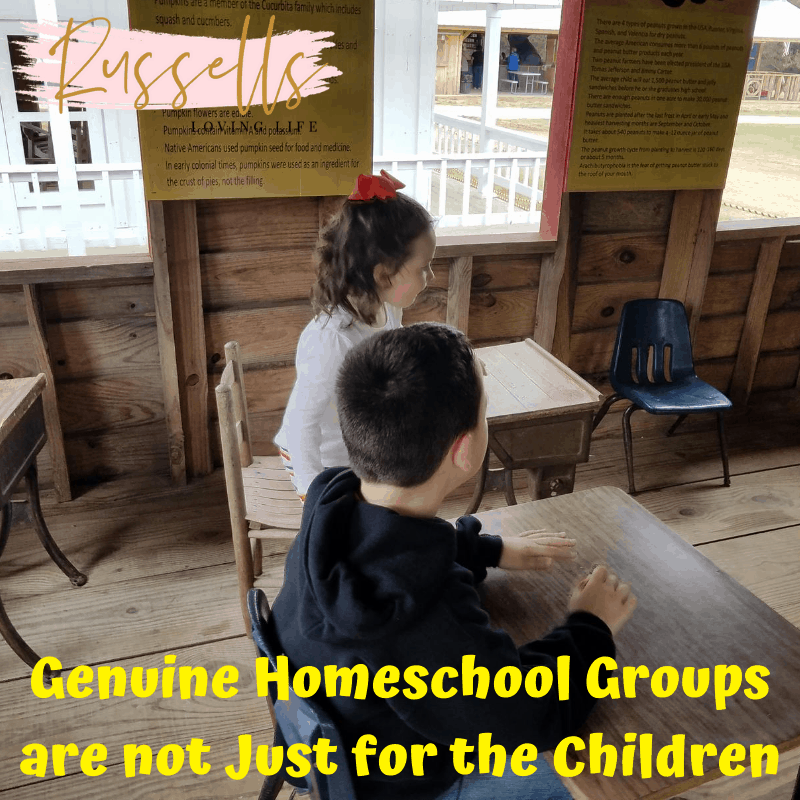
I think it is so important to find a homeschool group or a homeschool support system. It helped me so much my first year! I was able to find out what curriculums worked well for their families or why it did not work well for their families. I got to ask so many questions and they gave me so much advice, information, and answered questions that I had not thought to ask or did not know to ask. All this happened during park day, field trips, holiday parties, and lots of group chats through Facebook or text message groups.
I’m not saying I’m an expert and know it all. I’ve been homeschooling since 2012 and I’m always learning something new with the help of my homeschool support system. My homeschool support system is made up of my social media accounts and my local homeschool group. I’m thankful to these wonderful Moms that are always there to lend a helpful hand when I need it. It takes a village and I have been blessed with a great one!
A homeschool group is not just for the children in my opinion. It is a place for parents too. It is a place of learning, encouragement and support for one another. We should be there for one another and answering each other’s questions. It is a place for new homeschool parents to feel welcome and seek support, because we have all been there. A homeschooling group is for the entire family.
Homeschooling is not just something we do. It is our way of life. It is our journey and I’m glad to have such an awesome village!

Tip 5 Find an All-In-One Homeschool Curriculum for Your First Year
I always recommend an All-In-One curriculum for first time homeschooling families. An All-In-One homeschool curriculum is a curriculum that contains the main subjects and maybe an elective. The main subjects that are covered usually depend on the grade level. Most cover reading, writing, spelling, math, language arts, history and science. Some will add an elective like art or music.
I have used My Father’s World since 2014 and I love it! It allows me to teach multiple grades at the same time. I like to teach as many subjects as a family that I can . I currently teach Bible, Science, History and electives like art or music as a family.
Tip 6 Keep it Short
I have learned over the years it is better to keep the learning to short intervals. Both of my children are the play outside very active type children. Bailey more so than Bekah. When I first started teaching Bailey, I had to teach him a skill or subject and then give him a 5 minute break. During this break, he would get water, go to the restroom, and just move around to get the wiggles out. Then he could come back to the table ready for the next part of the lesson. Bekah is more of my sit down child and get it done. So with her, I did not have to take some many breaks. But I did break it up so she was not sitting during the entire lesson.
Below are two example videos of who I would break up the skills and lessons. In the first video, Bekah is over at our daily wall calendar. I always start a lesson at the table and when that lesson is finished, then we move over to the wall to work on something different in a different location. In the second video, you will see Bailey working on blending sounds. This is just a short skill he would work on in Kindergarten and then would move on to something else.
I hope all of this information helps you to understand what I mean when I say keep it short.
Tip 7 Keep it Fun
When you keep learning fun, children are learning and sometimes they do not even know they are learning. When children are in Kindergarten they require a lot of one on one work. They do not always have to learn by sitting still or doing a bunch of boarding worksheet.
Below are two videos that give you examples of how we keep it fun. The first part of the first video, shows you how I work with Bekah on sight words. She is stilling at the table using a worksheet, but we keep it fun for her by adding candy. In the second part of the first video, you will see Bailey throwing a small football at paper plates with sight words on them. This was a fun way for him to learn and be active at the same time.
Tip 8 Be Patient
As a homeschool mom, I have heard so many people say, “I do not have the patience to homeschool my child, or you must have a lot of patience.” We are all human and have our good days and bad days just like our children. But being patient with your child is a tip that applies to homeschooling and in everyday life.
Being patient when teaching your child or children is important. If you get aggravated or frustrated, they will pick up on that and will fell the same way. If you start to fell this way, take a break. Flexibility is the best part of homeschooling, you can do what works best for you and your child or children.
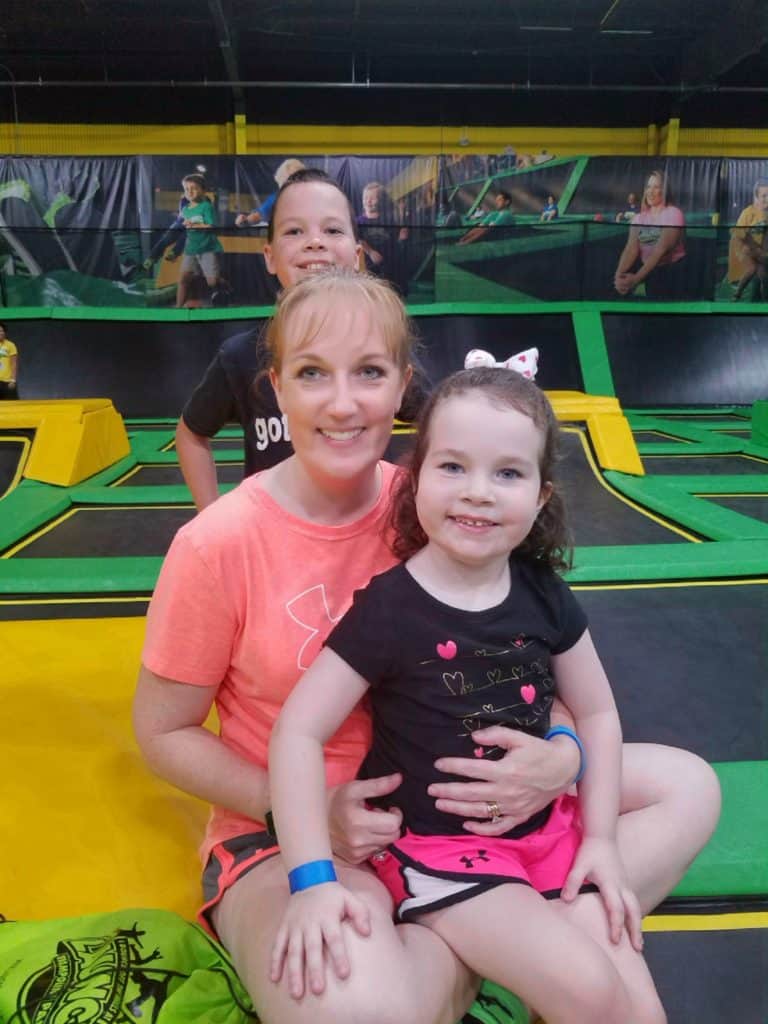
Tip 9 Feed Your Child a Healthy Breakfast
I know you are thinking, seriously?! But I have found over the years that feeding my children a healthy breakfast makes a huge difference on their ability to do their school work. Here is an example for you. If I feed Bailey yogurt with a tone of sugar in it, that sugar cause him to be more fidgety and less focused. If I feed him a cheese omelet, he tends to be less fidgety and more focused. This is just a fact that I have learned for teaching him over the years.
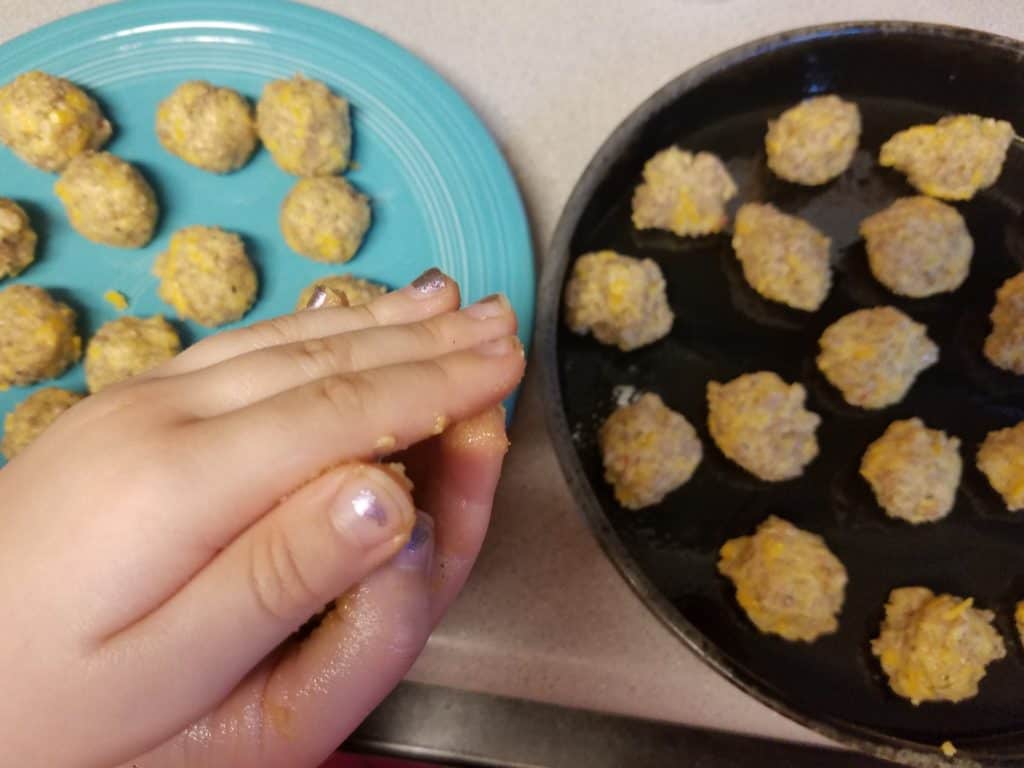
Tip 10 Deschooling and Tips to Help you start Process
Deschooling is the transitions period for a child leaving a structured institution of learning like a public or private school and changing to a more relaxed form of schooling at home. This transition not only affects the child, but parents can also go through this as well.
This transition period can be a difficult and confusing time for both you and your child. For a child that has been in a public or private school setting, they have learned what happens and is expected of them there. But coming home for school, your child may not be sure what will happen and what is expected of them. During this period of time you and your child are both discovering the new normal.
It all boils down to patients and understanding for you and your child. This transition period will not happen over night. You will hit a few ruff patches along the way, but it will not be like this forever. Once you and your child find the new normal together things will move much smother.
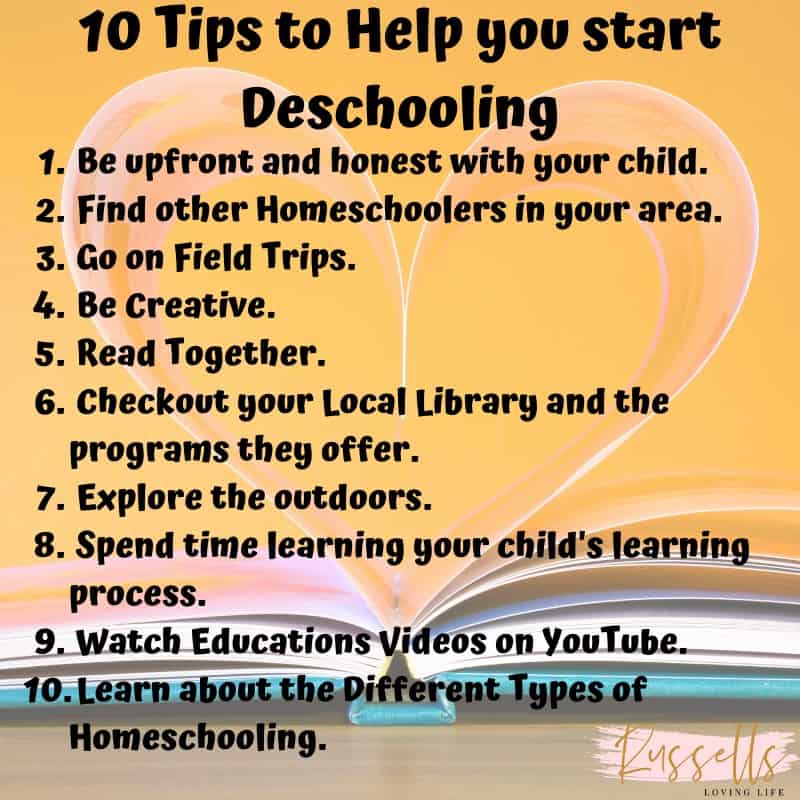
10 Tips to Help you start Deschooling
1. Be upfront and honest with your child. Help your child to understand that there will me an transition period for you and them. Explain that y’all will be learning how to homeschool together.
2. Find other Homeschoolers in your area. Most area have a homeschool group that has parties, field trips, park days, and just days to get together and learn. You can find these groups on Facebook, asking other homeschool moms, or even asking someone at your local library. Homeschool groups are not just for the children. You may also want to look into local Homeschool Co-ops.
3. Go on Field Trips. Field trips are one of my favorite parts of homeschooling. The children get to learn and have fun at the same time. Field trips do not have to cost an arm and a leg. Here is a list of fun and inexpensive Homeschool Field Trip ideas.
- Museums – they sometimes offer discounts to homeschoolers during weekday school hours, so check with your local museums to ask about homeschool field trip rates
- Public Library
- Post Office
- Police Station
- Fire Department
- City Hall
- Virtual Tours
- Zoo
- Nature Parks
- Aquariums
- Government Buildings
- Historic Places
- Military Landmarks
4. Be Creative. When I say be creative I mean, write a story and draw a picture about it, build something, make something or paint a picture. This should be a fun time.
5. Read Together. Find a comfortable place, a great book, and read it aloud to your child. You do not have to read the entire book in one day. Spread it out over a week or so.
6. Checkout your Local Library and the programs they offer. Our local library offers a preschool story time on Wednesday mornings, activities for school age children on Monday afternoons, and a great summer reading program. Libraries are not just a great resource for books.
7. Explore the outdoors. Exploring the outdoors can be fun. Here is a list of some fun things to do outdoors:
- Enjoy some time at your local park
- Have a picnic
- Take a field trip to a nature park
- Draw pictures in the backyard
- Notice all the different trees and flowers in your local park
- Go for a walk or a hike
8. Spend time learning your child’s learning process. This step may take some time. During this time, you will want to make notes of your child’s strengths and weaknesses. What subjects come natural to them and which ones they really struggle with. Think about what homeschooling style would work best. Then you will want to order a curriculum that fits your child’s and your family’s needs.
9. Watch Educations Videos on YouTube. YouTube can be a great resource! There are so many videos on so many subjects. Here is a great list of fun Science Experiments and Science Experiment Videos.
10. Learn about the Different Types or Styles of Homeschooling.
Tip 11 What qualifications do you need to homeschool your child?
According to the Coalition For Responsible Home Education or CRHE, most states do not require parent qualifications to homeschool. But there are 11 States that require a High School Diploma, GED, College Credits, or the completions of a Homeschool Study Course.
Here are the 11 states that require qualifications for you to teach your child at home. Please make sure to check what your state’s qualifications are in the link above.
- Georgia
- New Mexico
- North Carolina
- North Dakota
- Ohio
- Pennsylvania
- South Carolina
- Tennessee
- Virginia
- Washington
- West Virginia

Tip 12 Gameschooling
Gameschooling is when a board game is used to help a child learn a particular skill or to learn more about a subject. Gameschooling is a fun way for kids to learn more about a subject and have fun at the same time. Homeschool families decide to game school instead of using a curriculum for a given subject.
Gameschooling may not work for every family and every family homeschools differently. But here are some things I have learning about gameschooling.
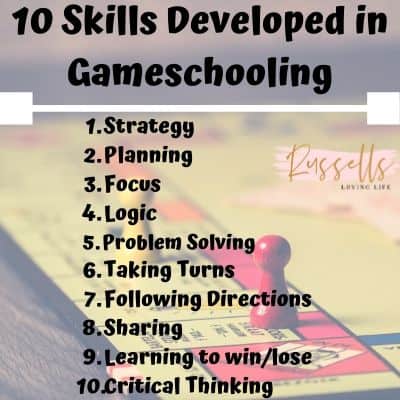
10 Skills Developed In Gameschooling
- Strategy – Strategy helps the children to make a plan to reach their goals in the game.
- Planning – Planning help the children to learn how to a organize their thoughts to make something happen.
- Focus – Focus teaching the children how to pay attention to what is right in front of them.
- Logic – Logic helps the children to learn a chain of reasoning.
- Problem Solving – Problem Solving teaching the children how to find the answer or solution to an issue.
- Taking Turns – Taking turns helps children to learn patience and that other like to have fun too.
- Following Directions – Following directions help children to learn how to listen and do what is expected of them.
- Sharing – Sharing teaching children that others like to have fun too.
- Learning to win and lose – Learning to win or lose can be a hard thing to learn for any age. But playing a board game teaches children that you are not always going to win.
- Critical Thinking – Critical thinking teaching the children how to come to a reasonable conclusion on their own.
I hope these 12 Homeschool Tips for Parents have given you some fun ideas to add to your homeschool!
